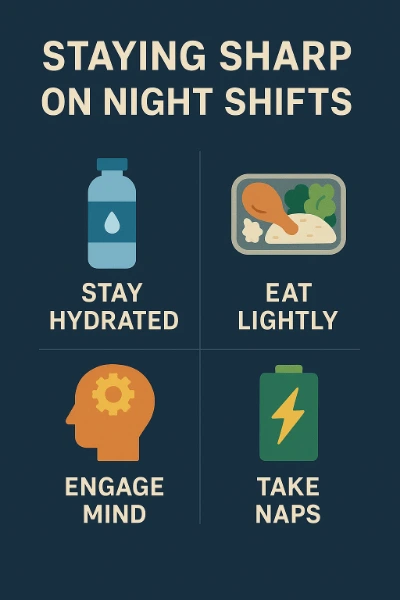The Scene at 2:00 AM
The Reality of the Overnight EMS Call
Late summer nights in EMS demand mental grit and physical resilience. The humidity clings to every inch of your uniform. Fatigue builds after hours of navigating emergency calls that rarely involve true emergencies. Responding to yet another non-urgent “fall” call taxes your patience and stretches your empathy. Sleep deprivation and the constant hum of the radio erode your sharpness, making each shift a battle to stay alert.
Heat, Fatigue, and Mental Clarity
High nighttime temperatures compromise both hydration and cognitive performance. A study from the CDC’s NIOSH division confirms that elevated temperatures increase mental error rates and slow response times (source). Sweat loss doesn’t just affect physical stamina—it chips away at mental clarity, creating a dangerous gap in situational awareness. Knowing how heat stress interferes with judgment helps crews better prepare and plan.
Fueling Performance When Food Options Suck
Gas Station Dinners and Their Consequences
Nutritional choices shrink drastically after 10 PM. The options are grim: prepackaged sandwiches, fried burritos, and energy drinks. High-glycemic foods spike blood sugar then crash it, draining energy and focus. Poor hydration from sugary drinks compounds fatigue. Eating poorly night after night also drives long-term metabolic strain and weight gain.
Smarter Prep Without Full Meal Prep
You don’t need full-blown meal prep to eat well on the night shift. Portable options like nuts, Greek yogurt, fruit, and protein wraps offer balance without refrigeration. Electrolyte packets in water bottles help retain hydration. Focus on balanced macros: protein sustains, fat satiates, and carbs fuel sharp responses. Even one or two good swaps per shift reduce energy crashes significantly.
Mental Games: Staying Sharp Between Calls
Tactics to Reset the Brain
During long lulls, the brain drifts. Reset with micro-activities: short walks, mental math, object scanning, or memory challenges. These short bursts of stimulation maintain cognitive momentum. Neuroscientists suggest these activities keep prefrontal cortex activity online, delaying mental fatigue. A shift partner can help by rotating challenge prompts.
Cognitive Stacking on Low-Volume Nights
Low-volume nights offer rare opportunities to combine mental freshness with productive engagement. “Cognitive stacking” means layering tasks that stimulate different areas of the brain. For example, listening to an audiobook while cleaning equipment blends learning with kinesthetic movement. These habits reinforce alertness while serving a dual purpose.
Alertness on Demand
The Mid-Shift Slump and Circadian Dips
Most EMS providers hit a wall between 2:30 and 4:00 AM. This is when core body temperature dips and melatonin peaks. According to PubMed Central research, circadian misalignment reduces vigilance and reaction speed dramatically (source). Without intervention, these dips can compound fatigue-related errors.
Sensory and Chemical Interventions
Simple techniques help override circadian fog. Cold water on the wrists and face sends a jolt through thermoreceptors. Caffeine works best when dosed strategically: one moderate intake early in the shift and another before the slump. Avoid overuse to prevent rebound fatigue. Chewing mint gum or using citrus scents can also re-engage neural circuits tied to alertness.
Long-Term Damage Control
Sleep Debt Recovery Is Real
You can’t cheat sleep forever. EMS fatigue studies show that 75% of providers experience chronic sleep restriction and poor recovery (source). Even if full 7-hour nights aren’t realistic midweek, recovery blocks on off-days help reset hormonal balance and metabolic repair. Blackout curtains, ambient noise machines, and magnesium supplements improve off-duty rest.
Preventing Accumulative Burnout
Burnout builds in layers: bad sleep, poor diet, low morale, and nonstop exposure to trauma. Long-term success means building counterweights. Those might include brief mental health check-ins, hobbies that engage different neural pathways, or even structured journaling. Emotional buffer zones prevent irritability from seeping into calls.
Coping with the “Fourth Fall Call”
The Rising Tide of Non-Emergencies
Late summer sees a spike in lift assists, dehydration-related calls, and “just-in-case” transports. These drag on patience and team morale. Recognizing that this trend has systemic causes—aging populations, lack of primary care access—helps providers avoid taking the frustration personally. It’s not about you.
Calibrating the BS Meter
Every responder has an internal BS meter. On night shifts, it swings wildly between sarcasm and compassion. Instead of letting cynicism take over, try reframing. A repetitive patient might be lonely, not manipulative. Emotional agility keeps your empathy tank from running dry.

3 Practical Tips
- Keep a shift kit: Include snacks, backup socks, wipes, and a portable charger. You’ll always be prepared.
- Use light cues: Bright light in the station reduces melatonin buildup. Red lighting keeps you calm but alert.
- Set a post-shift wind-down: Stretch, hydrate, and avoid screens 30 minutes before bed for deeper sleep.
FAQ: What Night Shift EMS Workers Ask Most
How can I fall asleep quickly after a night shift?
Use blackout curtains, keep a consistent wind-down routine, and avoid caffeine for 4–6 hours pre-sleep.
Is it okay to nap between calls?
Yes. A 20-minute nap can restore alertness and reduce error rates without grogginess.
What should I eat if I only have a gas station nearby?
Pick protein-rich options and avoid heavy sugar. Hydrate with water or low-sugar electrolyte drinks.
How do I avoid burnout during peak call seasons?
Monitor sleep, talk to your crew, and practice emotional detachment from non-critical calls.
Recap Table
| Factor | Risk Without Action | Strategy to Counteract |
|---|---|---|
| High Heat | Cognitive sluggishness | Hydrate, cool skin regularly |
| Poor Nutrition | Energy crashes | Prep small, protein-heavy snacks |
| Circadian Dips | Slower reaction time | Strategic caffeine, light exposure |
| Shift Repetition | Burnout, cynicism | Emotional framing, peer support |
| Sleep Restriction | Chronic fatigue | Prioritize recovery on off days |
The Art of Long-Term Survival
Staying sane during late summer overnight shifts means more than powering through. It means building systems that protect your clarity, your health, and your compassion. Good crews operate on preparation, mutual respect, and a healthy sense of dark humor. Those who last learn how to separate true emergencies from noise while keeping their standards sharp. The grind doesn’t stop—but neither do the ones who know how to manage it.

Jeromy VanderMeulen is a seasoned fire service leader with over two decades of experience in emergency response, training, and public safety management. He currently serves as Battalion Chief at the Lehigh Acres Fire Control & Rescue District and is CEO of the Ricky Rescue Training Academy, a premier provider of online and blended EMT and firefighter certification programs in Florida.
Jeromy holds multiple degrees from Edison State College and the Community College of the Air Force, and is pursuing his MBA at Barry University. He maintains top-tier certifications, including Fire Officer IV, Fire Instructor III, and Fire Inspector II, and has served as a subject matter expert for a court case. He is a member or the Florida Fire Chiefs Association.
Jeromy also contributes to state-level fire safety regulation and serves on several hiring and promotional boards.

